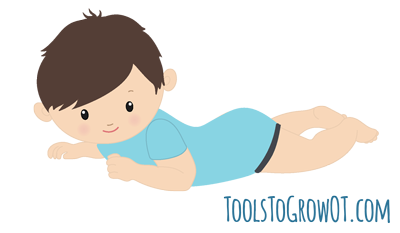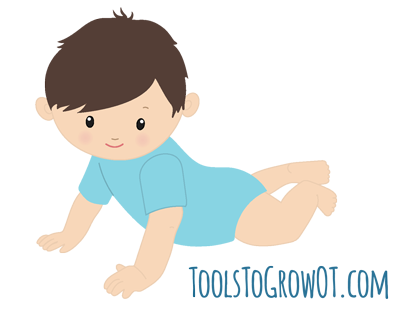Tummy Time
08.11.2014

As an Occupational Therapist with certification in Pediatric Neurodevelopmental Treatment and many years of experience in Early Intervention, I welcome this opportunity to blog about the positive outcomes and importance of tummy time for babies.
I would like to highlight and analyze some aspects of newborn to 12 month old normal motor development that are specifically linked to the prone position. As an Occupational Therapist, the focus will surround upper body, upper extremity, and hand development.

As therapists we understand how earlier experiences affect a child’s later development. In this therapist’s point of view, for most babies it is desirable and extremely important to spend time daily on his/her belly (prone) while alert and supervised. In addition to this, it is also significant to be mindful of the temptation to place babies in “devices” for extended periods. In many cultures the use of car seats, baby swings, and the like are necessary and extremely helpful to parents. But a baby that experiences prolonged time in these devices may have negative effects. With prolonged use babies will quickly adapt their posture to the contours of the device; this can affect freedom of movement, skeletal alignment, and skull shaping.
For the purpose of highlighting the developmental significance of a baby experiencing sufficient time on their belly, two terms will be used. The first is “developmental consequence”. This term will be used to highlight the importance of the prone position on a baby’s immediate development. The second term to be used is “future implications”. This will refer to the long term consequences of limited experience in the prone position.
So as to present the significance of tummy time on a child’s immediate and future development, it is beneficial to review a few relevant principles of normal development.
- Anti-gravity control is needed for initiating, maintaining, and terminating movement. In other words, a baby that does not receive adequate practice moving his head and limbs up against gravity while positioned on their belly, may not have the opportunity to develop optimal strength. This principle is used each time an Occupational or Physical Therapist engages their preschool and school age clients in prone activities. Think about the “future implications” of decreased muscular strength. Consequences may range from poor sitting posture at the classroom desk to the need for adapted seating devices.
- Freedom of movement in space of one body area is reliant upon weight bearing in another area. For example, a baby positioned in prone that bears weight on her elbows has the freedom to explore with her hands while rotating her forearms from pronation to supination. Any Occupational Therapist that has treated a child with incomplete active forearm movement realizes the functional challenges encountered by such a child. In terms of “future implications”, try to use crayons, scissors, keys, zippers, or a fork with poor or absent forearm rotation.
- Elongation of muscles precedes activation of a single or group of muscles. If unfamiliar with this principle it may sound daunting….it is not! For the purposes of this blog, just remember that while a baby spends time in prone, the anterior muscles (ex: hip flexors, abdominals, neck flexors) are being lengthened. As a result of this muscle elongation, these same muscles (ex: hip flexor, abdominals, neck flexors) are afforded the opportunity to fully activate in a controlled manner when in the supine position. Therefore, by placing a baby in prone, the parent or caregiver is also helping a child move while in supine!
- There must be a balance between the anterior and posterior body planes. While in prone the child must achieve full extension against gravity with elongation of the antagonistic flexor muscles. Likewise, while in supine the child must also achieve flexion against gravity with elongation of the antagonistic extensor muscles. Regarding future implications, this balance is necessary before automatic reactions and equilibrium reactions can be fully realized.
Assuming a child is developing in a typical manner and has regular belly time experience, the next section will focus on select highlights of chronological development in the prone position. Consider the “developmental consequence(s)” of each area presented, and why this therapist is an advocate for safe and supervised routine tummy time for babies.
Newborns: When prone on a firm surface, a healthy and typically developing newborn can turn his head to keep his airway open. The newborn needs the opportunity of being prone with pressure on his upper shoulder and hands as a fulcrum to allow for movement in his neck to raise his head.
One Month Old Baby: When prone, the baby’s shoulders start to depress into the surface with more weight bearing. The baby’s weight is beginning to be shifted toward her upper chest. Regarding “developmental consequences”, this sets the stage for future activation of the muscles of the scapula and spine.
Two Month Old Baby: In prone the baby begins to experience active adduction of the scapula. This is very important for reinforcing extension of the spine.
Three Month Old Baby: In prone the baby should display more combinations of shoulder movement due to dissociation between the humerus and scapula. Regarding “future implications”, full dissociation is necessary for controlled reaching in space. With more movement at the shoulder, the three month old baby experiences a shifting of weight between the ulnar and radial side of her hand. Without belly time, a baby will miss this opportunity for opening and expanding the hand so as to develop arches. Regarding “future implications”, remember fully developed hand arches provide the foundation for individual finger movements and graded grasp and release.
Four Month Old Baby: At this age babies are social and easier to engage. There is good head control in prone. The Landau reaction provides strong adduction in the scapula in its shortened range. Regarding future implications, this is very important for future grading of shoulder movements. The baby also starts to push with one shoulder into the surface; this elicits diagonal movement in the trunk. Diagonal movements are necessary pre-requisites for future equilibrium reactions/balance.
Five Month Old Baby: In prone the baby can use his arms to push up high enough to place the base of support at the pelvis. This lengthens the hip flexors to for optimal activation. This is necessary for assuming the quadruped position. At this age the baby can also reach with one arm while the other arm is bearing weight on the surface. While doing so the child rotates his torso. Once again, this is important preparation for the rotation that is needed for equilibrium, reaching across midline, laterality, and bilateral integration.
Six Month Old Baby: While in prone, the baby begins to reach up high with one arm, thereby rotating one side of his pelvis off the support surface. As a developmental consequence, the baby is preparing to use the movements needed to creep and move into sitting. While in prone, babies also begin to use their arms to push back and shift their weight from side to side. Without such actions, possible future implications may include decreased upper extremity strength and poor hand arch formation. This may compromise future hand differentiation that is needed for complex manipulation.
Seven-Nine Month Old Baby: At this age the baby pivots and belly crawls while prone. Without this experience overall upper body and arm strength may be decreased. Remember, for effective protective extension a child needs strong arms. Regarding future implications, it is reasonable to consider that a child may refrain from upright locomotion (such as cruising, early walking) if he/she has ineffective protective extension. Around 8 months a baby may move from quadruped into the bear position. The bear provides an excellent opportunity to lengthen the hamstring muscles. In terms of future implications, without lengthened hamstrings and freedom in all planes of pelvic movement, a child may not be able to use a variety of sitting postures. Occupational Therapists know all too well how poor sitting posture compromises bilateral integration and hand use skills.
Ten-Twelve Month Old Baby: Given the opportunities afforded by regular tummy time experience, at this age a baby has full spinal extension. This allows for optimal reaching, rotation, and bilateral hand use while floor sitting. The baby can freely move out of prone to sit, creep, or pull to stand. He/she is on their way!
To summarize, in this therapist’s point of view, for most babies it is desirable and extremely important to spend time daily on his/her belly (prone) while alert and supervised. Tummy time experience between the newborn and twelve month age impacts future development in many crucial ways. This blog highlighted the impact on overall body strength, mobility, freedom of movement in the upper extremities, balance, sitting posture, and bilateral integration. In conclusion, it seems clear that if a baby spends safe and supervised time in prone (on their tummy), the child will be afforded the best opportunity for optimal motor and functional development.
Shelley Galvin OTR/L, C/NDT
Tools To Grow, Inc.
Tools to Grow, Inc. has two Tummy Time Brochures that are FREE to download. One brochure is for Caregivers/Parents and the other brochure is for Health Care Professionals. You can download these high quality PDF Brochures here:
Brochure 1 - Parents/Caregivers Brochure - Tummy Time: What is It?
Brochure 2 - Health Care Professionals - Tummy Time: Developmental Consequences & Future Implications
This Tummy Time Blog is a Part of
Therapy Blogger Blog Hop
We are so excited to be part of this Tummy Time Blogger Hop! Below you will find all the posts on Tummy Time. So many great ideas and thoughts on tummy time from Occupational Therapists and Physical Therapists.
The Importance of Tummy Time for Babies - Golden Reflections Blog
Tummy Time & Baby's First Year - The Recycling OT
How to Use a Therapy Ball to Make Tummy Time Easier and More Fun for Baby - Mama OT
5 Awesome Toys for Tummy Time! - The Inspired Treehouse
Terrific Tummy Time Positions - Your Kids OT
Tips For Tummy Time From A Physical Therapist - Pink Oatmeal
Tummy Time : The Basics - Therapy Fun Zone
Tummy Time Tips - Pedatric OT Tips
Tummy Time Just Isn't For Babies - Your Therapy Source
Tummy Time - More Than Just A Buzz Word - Starfish Therapies
Tummy Time Never Gets Old - Playapy Platform
Related Topics: Early Intervention , Fine Motor Skills, Free Resources , Pediatric Neurodevelopmental Treatment , Therapy Blog Hop



